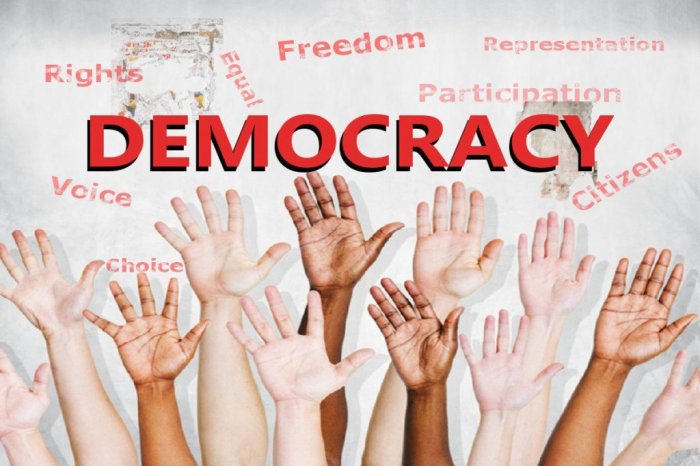What are the greatest attributes of our democracy essay – What are the greatest attributes of our democracy? This is a question that has been asked for centuries, and there is no easy answer. However, by examining the principles and institutions that make up a democracy, we can begin to understand what makes it such a valuable form of government.
One of the most important attributes of a democracy is freedom of speech and expression. This freedom allows citizens to express their opinions and ideas without fear of censorship or reprisal. It is essential for a healthy democracy, as it allows for the free exchange of ideas and the peaceful resolution of conflict.
Freedom of Speech and Expression

Freedom of speech and expression are fundamental to any democracy, enabling individuals to freely express their thoughts, ideas, and beliefs without fear of censorship or reprisal. These freedoms are enshrined in constitutions and laws, ensuring that citizens can engage in open and robust political discourse, criticize the government, and hold those in power accountable.Examples
of how these freedoms are protected and exercised include:
- Protection from government censorship and prior restraint
- Freedom of the press, allowing journalists to report on matters of public interest
- Academic freedom, safeguarding the right of scholars to conduct research and express their findings
These freedoms are essential for political discourse and social progress, as they foster the exchange of ideas, challenge dominant narratives, and promote critical thinking and informed decision-making.
Equality and Rule of Law

Equality before the law is a cornerstone of democracy, ensuring that all citizens are treated fairly and have equal opportunities, regardless of their background or status. The rule of law establishes a framework of laws and institutions that apply equally to everyone, guaranteeing justice and protecting individuals from arbitrary or discriminatory treatment.Examples
of laws and institutions that uphold equality and justice include:
- Constitutions that guarantee equal rights and protection under the law
- Independent courts and legal systems that adjudicate disputes fairly
- Anti-discrimination laws that prohibit unfair treatment based on race, gender, religion, or other protected characteristics
Equality and the rule of law are essential for creating a just and equitable society, where all citizens have the opportunity to thrive and contribute to the common good.
Representative Government and Political Participation
Representative government is a system in which citizens elect representatives to make decisions on their behalf. This allows for widespread political participation and ensures that the government is responsive to the needs and interests of the people.Different forms of political participation include:
- Voting in elections
- Running for public office
- Engaging in civic organizations and advocacy groups
Citizen involvement in shaping public policy and decision-making is crucial for a healthy democracy, as it ensures that the government is accountable to the people and that policies reflect the diverse perspectives and priorities of society.
Majority Rule and Minority Rights
Majority rule is a fundamental principle of democracy, where decisions are made based on the will of the majority. However, it is equally important to protect the rights and interests of minority groups, ensuring that their voices are heard and their rights are not trampled upon.Mechanisms
and institutions designed to protect minority rights include:
- Constitutional provisions that guarantee minority rights and protections
- Representation of minority groups in government and public institutions
- Independent courts and human rights commissions that can adjudicate cases of discrimination or rights violations
Democracies must strike a balance between majority rule and minority rights, ensuring that the rights of all citizens are respected and protected.
Civil Liberties and Human Rights

Civil liberties and human rights are fundamental freedoms and protections that are essential for a democratic society. These rights include freedom of speech, religion, assembly, and due process of law.These rights are protected and enforced through legal and institutional frameworks, including:
- Constitutions and bills of rights
- Independent courts and judicial systems
- Human rights organizations and advocacy groups
Democracies have a responsibility to expand and strengthen civil liberties and human rights over time, ensuring that all citizens enjoy the full range of freedoms and protections guaranteed by a democratic society.
FAQ Compilation: What Are The Greatest Attributes Of Our Democracy Essay
What is the most important attribute of a democracy?
There is no one most important attribute of a democracy, as all of the attributes listed above are essential for a healthy democracy. However, freedom of speech and expression is often considered to be the most important, as it allows for the free exchange of ideas and the peaceful resolution of conflict.
How can we ensure that our democracy remains strong?
There are many ways to ensure that our democracy remains strong. Some of the most important include:
- Participating in the political process by voting, running for office, and engaging in civic organizations.
- Defending our civil liberties and human rights.
- Educating ourselves about the issues facing our democracy.
- Holding our elected officials accountable.